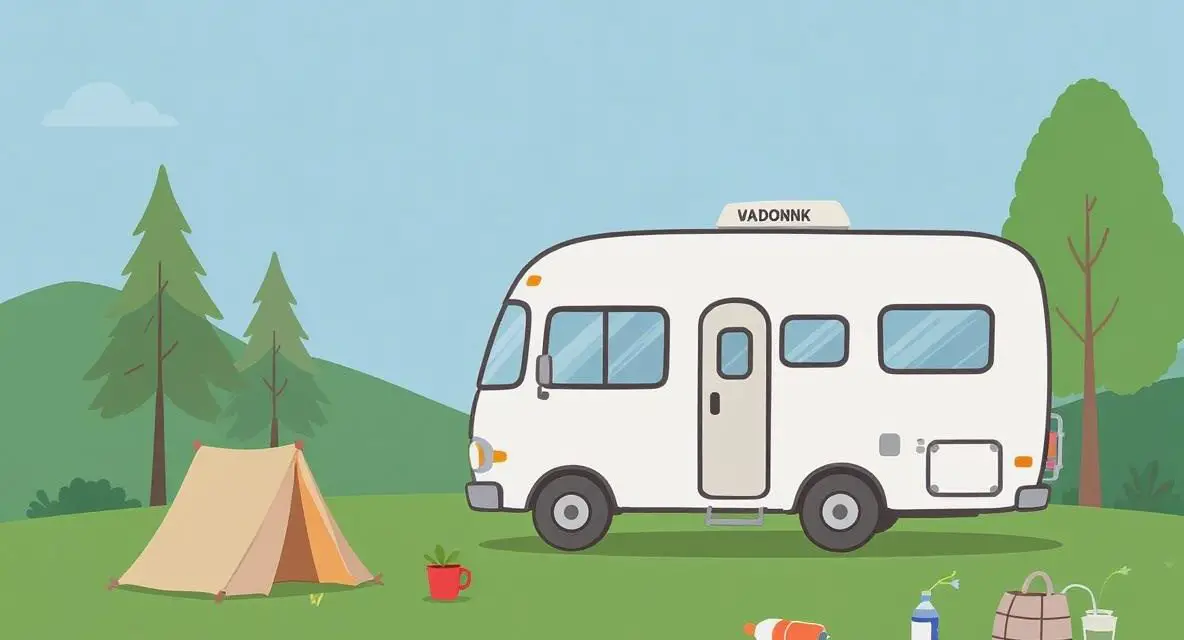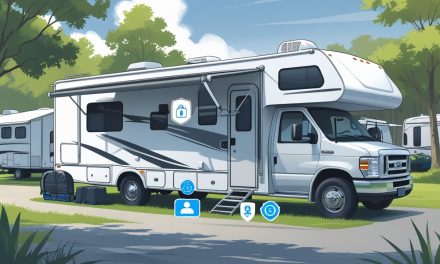Have you ever pulled into a beautiful campground, excited for a peaceful weekend, only to discover your neighbor seems to have missed the memo on campground etiquette?
As you set up your perfect campsite, you might notice the not-so-subtle glares from nearby campers. Before you assume they’re just unfriendly, consider whether you might be committing one of these seven camping faux pas.
By identifying these habits, you’ll not only improve your own camping experience but also become the kind of neighbor everyone hopes to park beside. So grab your favorite camping chair, maybe a notepad, and let’s explore why you might unintentionally become the talk of the campground—for all the wrong reasons!
Would you like to save this article?
1. Your Campsite Looks Like a Yard Sale Explosion
The first telltale sign you might be the campground’s unwanted neighbor is when your site resembles the “before” scene of a cleaning commercial. You know what this looks like—your lawn chairs with mysterious stains scattered haphazardly, half-deflated pool floats that haven’t seen water in days, and your snack wrappers fluttering into neighboring sites like confetti.
The Messy Campsite Statistics:
- According to the National Park Service, rangers spend an average of 4 hours per day addressing improperly maintained campsites
- Loose trash at campsites is among the top 3 complaints from fellow campers
- A typical messy campsite can attract wildlife and increase human-animal conflict by 40%
| Campsite Item | Proper Storage | Improper Storage |
|---|---|---|
| Chairs | Folded when not in use | Left open, blocking pathways |
| Food | Secured in containers | Left out, attracting wildlife |
| Trash | In designated bins | Scattered around site |
| Equipment | Organized in designated area | Spread across entire site |
You might think your camping fee includes a personal maid service. News flash: that raccoon rummaging through your potato chip bag at 2 AM is not staff—and he doesn’t do windows.
2. You’re Flicking Cigarette Butts Like Confetti
Nothing says “I love nature” quite like decorating it with cigarette butts. If you’re treating the campground like your personal ashtray, congratulations—you’ve earned a spot on the unofficial “please don’t camp next to me” list.
Cigarette Butt Facts:
- Cigarette filters contain plastic that can take up to 10 years to decompose
- A single cigarette butt can contaminate up to 1 gallon of water
- In 2022, cigarette butts remained the #1 item collected during campground cleanups
- Wildlife often mistake cigarette butts for food, causing serious health issues
Your Olympic-level flicking techniques might impress even the most dedicated javelin throwers. Just remember, that gold medal you’re competing for? It’s actually a “Most Likely to Be Reported to the Camp Host” trophy.
3. You’re Using the Fresh Water Station as Your Personal Kitchen Sink
The potable water station is meant for—surprise!—collecting drinking water. It’s not your personal dish-washing facility, no matter how convenient it might seem after that chili dinner you prepared.
Water Station Misuse Data:
- Cross-contamination at water stations affects an average of 14 other campers
- 65% of RVers report witnessing improper use of freshwater stations
- Improper sanitation at water stations can lead to common illnesses like giardia
| Do’s at Water Stations | Don’ts at Water Stations |
|---|---|
| Fill drinking containers | Wash greasy cookware |
| Rinse hands quickly | Dispose of food waste |
| Use appropriate hoses | Block access for long periods |
| Report maintenance issues | Use soap or detergents |
The water station isn’t the set of “Hell’s Kitchen,” so maybe save your dramatic pot-scrubbing for somewhere that doesn’t supply everyone’s drinking water. Unless you’re trying to help fellow campers build immunity to your leftover spaghetti sauce, of course.
4. You Leave a Biohazard Scene at the Dump Station
The dump station is perhaps where your camping reputation is made or destroyed. If you’re leaving it looking like a deleted scene from a horror movie, complete with mystery puddles and abandoned gloves, you’ve achieved peak campground villain status.
Dump Station Etiquette Statistics:
- The average RVer spends just 8 minutes at a dump station
- Proper cleanup adds only 2 minutes to the process
- 72% of campground complaints about other campers involve dump station mishaps
- Sanitizing dump stations costs campgrounds an estimated $2,000 annually per station
If your departing words at the dump station are “It’s mostly just water,” that’s probably what they also said at Chernobyl. Nobody wants to play “guess that puddle” at 7 AM when they’re trying to start their vacation.
5. You’re Burning Trash in the Fire Pit
Your campfire should smell like s’mores and pine, not like a tire factory having an identity crisis. Burning trash isn’t just inconsiderate—it’s potentially toxic and definitely marks you as the campground rookie.
Fire Pit Misuse Facts:
- Burning plastic releases dioxins, which are harmful to breathe
- 23% of campground fires originate from improperly managed fire pits
- Melted aluminum cans in fire pits cause injuries to 1 in 20 campers annually
- Campground hosts spend approximately 45 minutes per site cleaning improperly used fire pits
| Safe to Burn | Never Burn |
|---|---|
| Untreated wood | Plastic bottles/containers |
| Paper (limited amounts) | Styrofoam |
| Natural kindling | Aluminum cans |
| Manufactured fire logs | Food packaging |
Your campfire shouldn’t smell like you’re conducting a science experiment gone wrong. If the family two sites over is breaking out gas masks instead of marshmallows, you might want to reconsider your fire pit strategy.
6. You’re Not Picking Up After Your Dog
You all love your four-legged camping companions, but if you’re leaving “surprises” around the campground, you’re definitely on the fast track to becoming the most unpopular person at the RV park.
Pet Waste Facts:
- Dog waste can take up to a year to decompose naturally
- A single gram of dog waste can contain 23 million fecal coliform bacteria
- Pet waste is the third largest source of bacterial contamination in urban waterways
- 40% of campers report stepping in unpicked dog waste at campgrounds
It’s fascinating how you can remember to pack your pet’s Instagram-worthy bandanas and coordinating leashes but somehow forget the most basic tool of pet ownership—the poop bag. It’s not a team sport; we’re not all responsible for your dog’s output.
7. You’re Contributing to Bathroom Destruction
Campground bathrooms can be challenging enough without adding your special touch of chaos. If you’re treating the facilities like your personal laboratory for hygiene experiments, you’re definitely on the campground’s most unwanted list.
Campground Bathroom Statistics:
- Campground hosts spend an average of 2 hours daily cleaning bathroom facilities
- 85% of campers rate clean bathrooms as their top priority when choosing a campground
- Improperly disposed paper products cause 60% of campground plumbing issues
- The average cost to repair vandalized or misused campground bathrooms exceeds $5,000 annually
| Bathroom Etiquette Do’s | Bathroom Etiquette Don’ts |
|---|---|
| Clean up after yourself | Leave personal items behind |
| Report maintenance issues | Use excessive toilet paper |
| Keep shower time reasonable | Dispose of non-flushable items in toilet |
| Wear appropriate footwear | Forget others need to use facilities |
The campground bathroom isn’t an avant-garde art installation where you get to express yourself through creative tissue placement. You’re an adult—at least, that’s what your driver’s license claims.
Conclusion
There you have it, fellow RV enthusiasts—seven surefire ways you might become the neighbor nobody wants at the campground. The good news? If you recognized any of your habits in this list, it’s never too late to reform your camping ways! Remember that campgrounds are shared spaces where your actions directly impact everyone around you. By following proper etiquette, you’ll not only improve your own camping experience but also contribute to a more enjoyable environment for all.
The next time you’re setting up camp, take a moment to consider how your actions might affect your neighbors. Keep your site tidy, dispose of waste properly, respect shared facilities, and be mindful of noise levels. These simple considerations can transform you from a campground menace to a model camper everyone wants to invite over for s’mores!
Until next time, happy camping, and remember—leave no trace, except perhaps the impression that you were the best neighbor anyone could ask for at the campground!
SOURCES
- The Camping Loop YouTube Channel – “Top 7 Reasons You Might Actually Be A Campground Slob Without Even Realizing!”
- National Park Service Guidelines for Campground Etiquette
- Leave No Trace Outdoor Ethics Principles
- Smokefreeoregon.com – Environmental Impact of Cigarette Waste
- The Road Trip Expert – RV Dump Station Guide
- LTK Camping – Pet Camping Guidelines







